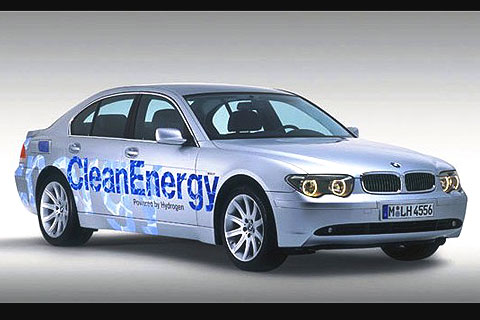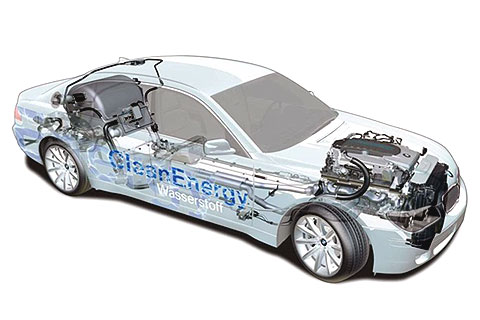
Like fuel cell vehicles, H2ICEs are considered zero emission vehicles with exhaust emissions being mainly water.
BMW Hydrogen7Most automobile manufacturers are working on fuel cell vehicles. BMW has developed another technology to better assure its cars will still be "Ultimate Driving Machines", when running on hydrogen. The whirr of electric motors would be out of character for BMWs. This accomplished by modifying its internal combustions to run on hydrogen, calling them Hydrogen Internal Combustion Engines, or H2ICEs.
BMW had been working H2ICEs for over 25 years and has just unveiled its seventh generation H2ICE. In 2006, BMW put nearly 100 bi-fuel BMW Hydrogen 7s in the hands of drivers in the US and other countries. Now, BMW is introducing the mono-fuel BMW Hydrogen 7. In the bi-fuel version, the engine can run on either hydrogen or gasoline, while mono-fuel one uses only hydrogen.
The mono-fuel BMW Hydrogen 7's 6-liter, V-12 engine has been optimized to run exclusively on hydrogen to provide even lower emissions, increased engine performance, reduced fuel consumption and greater range than the bi-fuel version of the Hydrogen 7. Both versions share the performance, comfort, and safety qualities of every production, top-of-the-line BMW 7 Series car.

H2ICEs could speed up the building of the infrastructure for the transportation sector for the Hydrogen Economy.
BMW Hydrogen7Like fuel cell vehicles, H2ICEs are considered zero emission vehicles with exhaust emissions being mainly water. Since the hydrogen fuel contains no carbon, no carbon dioxide is produced when it is combusted. There are also no hydrocarbons or other pollutants. That's because the pollutants in the air are taken in to provide oxygen for the fuel cell, which are then consumed by the engine, plus minute amounts of lubricating oil. Thus, there are barely detectable exhaust emissions. Indeed, they are so tiny, BMW had to turn to the Argonne National Laboratory, the only testing laboratory in the U.S, capable of measuring such minute emissions.
Most experts feel fuel cell vehicles that are still several, even many, years in the future; H2ICEs are here today. Beside the BMW Hydrogen 7s, Ford has already delivered several shuttle buses with H2ICEs and Mazda has several cars with their rotary (Wankel) engines running on hydrogen.
H2ICEs could speed up the building of the infrastructure for the transportation sector for the Hydrogen Economy. H2ICEs have almost all the advantages of a hydrogen fuel cell, but at a fraction of their cost, so the could be affordable sooner. Unlike fuel cells, they require a minimal investment in changing the engine manufacturing and maintenance infrastructure. BMW builds the Hydrogen 7 sedans and its V12 engine alongside regular 5-, 6- and 7-Series sedans in Germany. The same equipment, tools and facilities can be used for maintaining and servicing them. Training of technicians is much like that for other new alternative fuels; fuel cells require training for a completely new technology.




